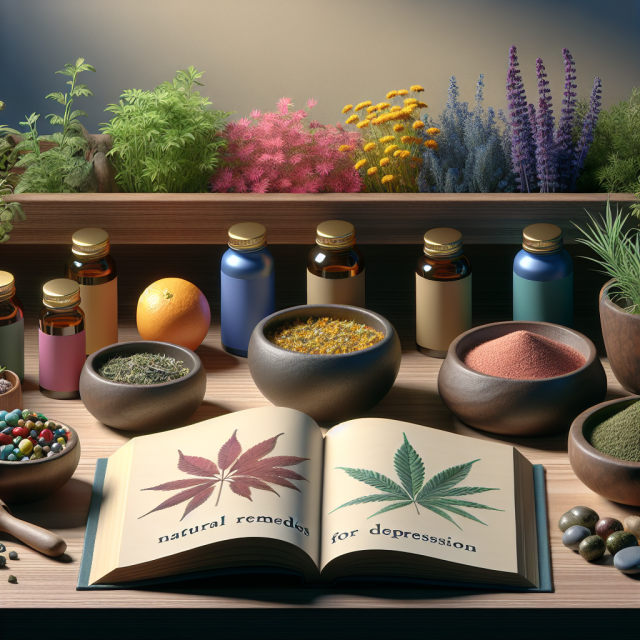
Depression is more than just feeling sad. It’s a daily struggle that can feel like a heavy cloud hovering over you, never giving way to sunshine. While medication and therapy are common treatments, many people also look to natural remedies for depression for a more holistic approach to healing. So, what are some of the best natural options to lift your spirits and bring back your sense of well-being?
Table of Contents
Introduction
Depression can make even the simplest tasks feel overwhelming. While prescription medications are lifesaving for many, exploring natural remedies for depression can complement traditional treatments. From the food you eat to the air you breathe, small changes can have a big impact on your mental well-being. Let’s explore these holistic strategies that may bring a spark back into your life.
The Power of Exercise
Exercise isn’t just good for your body; it’s a game-changer for your mind. Physical activity releases endorphins, also known as “feel-good” hormones, which can help alleviate depressive symptoms.
- Start Small: Even a 10-minute walk can make a difference.
- Find What You Love: Whether it’s yoga, dancing, or cycling, make it enjoyable so it doesn’t feel like a chore.
Tip: If getting started feels impossible, consider asking a friend to join you for accountability. For more exercise tips, check out HealingWell’s community.
Nutrition: You Are What You Eat
Food fuels your body and your mind. Diets rich in omega-3 fatty acids, antioxidants, and B vitamins have been linked to improved mood and mental health.
- Eat More Omega-3s: Found in salmon, walnuts, and flaxseeds, omega-3s are known for their brain-boosting properties.
- Limit Processed Foods: Sugary and high-fat foods can worsen depressive symptoms.
Resource: Learn more about nutrition for mental health at HealingWell.
Herbal Supplements
Certain herbal remedies, like St. John’s Wort and SAM-e, have shown promise in managing depression. But caution is key: herbs can interact with medications, so always consult your doctor first.
- St. John’s Wort: Popular in Europe for treating mild depression.
- SAM-e: A compound that may improve mood by boosting serotonin levels.
External Link: For detailed research on supplements, visit Mayo Clinic’s guide on herbal supplements.
The Benefits of Mindfulness and Meditation
Mindfulness is more than a trendy buzzword; it’s a way to stay present and calm. Meditation can reduce stress and promote a sense of well-being, making it a powerful tool for those struggling with depression.
- Guided Meditation: Start with a 5-minute guided session to ease into it.
- Mindful Breathing: Focus on your breath to quiet racing thoughts.
Analogy: Think of your mind as a shaken snow globe. Mindfulness allows the “snow” to settle, revealing clarity and peace.
Quality Sleep Matters
Poor sleep and depression often go hand in hand. Prioritizing quality sleep can significantly impact your mood and energy levels.
- Establish a Routine: Go to bed and wake up at the same time daily.
- Create a Relaxing Environment: Keep your bedroom cool, dark, and quiet.
Tip: Avoid screens at least an hour before bedtime to improve sleep quality.
Connecting with Nature
Spending time outdoors can boost your mood and energy levels. Sunlight increases serotonin, a natural mood stabilizer.
- Go for a Walk in the Park: Even a short stroll in nature can have calming effects.
- Garden or Sit by the Water: Being near greenery or bodies of water can be incredibly grounding.
Remember: Nature has a healing power that can’t be replicated indoors.
The Impact of Social Connections
Humans are wired for connection. Isolation can worsen depressive symptoms, while meaningful interactions can uplift your spirits.
- Talk to a Friend: Sometimes, sharing how you feel can lighten the load.
- Join Support Groups: Connecting with others facing similar challenges can provide comfort and understanding.
Visit: HealingWell’s support forums for a welcoming community.
Aromatherapy: Scents That Heal
Certain essential oils like lavender and citrus can help reduce anxiety and promote relaxation.
- Lavender Oil: Known for its calming effects, perfect for bedtime.
- Citrus Oils: Energizing and uplifting, great for a morning boost.
How to Use: Diffuse oils in your room or add a few drops to a warm bath.
Journaling for Emotional Release
Writing down your thoughts can be incredibly therapeutic. Journaling helps you process emotions and gain clarity.
- Gratitude Journaling: Write three things you’re grateful for daily.
- Emotional Release: Pour out your worries and fears onto the page.
Tip: Your journal is a safe space—no need to censor yourself.
Conclusion
Managing depression can feel like an uphill battle, but you don’t have to do it alone. Incorporating natural remedies for depression into your daily routine can bring relief and a sense of control. Remember, healing is a journey, not a race. Small steps add up, and every effort counts.
FAQs
- Are natural remedies for depression effective?
While not a cure, natural remedies can complement traditional treatments and improve overall well-being. - Can I take herbal supplements while on antidepressants?
Always consult your healthcare provider, as some herbs can interact with medications. - How often should I practice mindfulness meditation?
Start with 5-10 minutes daily and gradually increase as it becomes more comfortable. - What foods are best for boosting mood?
Foods rich in omega-3s, leafy greens, and berries can support brain health and improve mood. - How long does it take to see improvements with lifestyle changes?
It varies, but many people notice positive changes within a few weeks of consistent effort.





